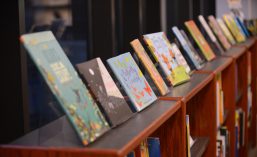The Lilies
Written by Quinn Diacon-Furtado
HarperTeen
Ages 13-17
Available April 30th, 2024
Welcome to Archwell Academy, an “all-girls” preparatory school that honors legacy and scrutinizes difference, epitomized by the school’s exclusive secret society—the Lilies. Initially at odds with each other, Drew (a non-binary transfer student), Blythe (striving to be the first Black valedictorian), Veró (Latina daughter of a Senator doubling as a guerilla artist), and Rory (chancellor’s daughter and school founder’s great-granddaughter struggling with addiction) quickly become entangled when one of their classmates—and Lilies recruit—goes missing. Stuck in a time loop that forces each of them to relive their most shameful memories leading up to Charlotte’s disappearance, Drew, Blythe, Veró, and Rory must wrestle with their guilt. The focus remains on saving Charlotte, but a mysterious fifth narrator slowly reveals that the students are also solving an age-old murder of another student: Rory’s great aunt Lillian, the namesake of the Lilies. As they work together through a troubling past and present, these unlikely allies grow into trusting friends that work in solidarity to rewrite history.
Like many academic thrillers, Archwell is insulated in a bubble of boarding school rules, dynamics, and traditions. But Diacon-Furtado also intentionally sets Archwell in a DC suburb against a familiar backdrop of modern threats, like mass shootings and transphobic legislation, where boarding school can’t protect students from the real world. As the story unfolds, so do the larger metaphors of trauma cycles, privilege, truth, and even a new meaning to living in the closet, a.k.a. a time loop. In this debut novel, Diacon-Furtado appeals to the complex and ethical questions of teenage life in their careful crafting of unreliable, imperfect characters that ultimately become redeemable during their time together. Using a candid voice and unexpected plot twists, Diacon-Furtado simultaneously creates anticipation, anxiety, and hope that will keep readers thinking. This fast-paced, queer, genre-bending story of solidarity acts as a mirror, asking readers not only how they are reinforcing harmful cycles but also how they can break them.

